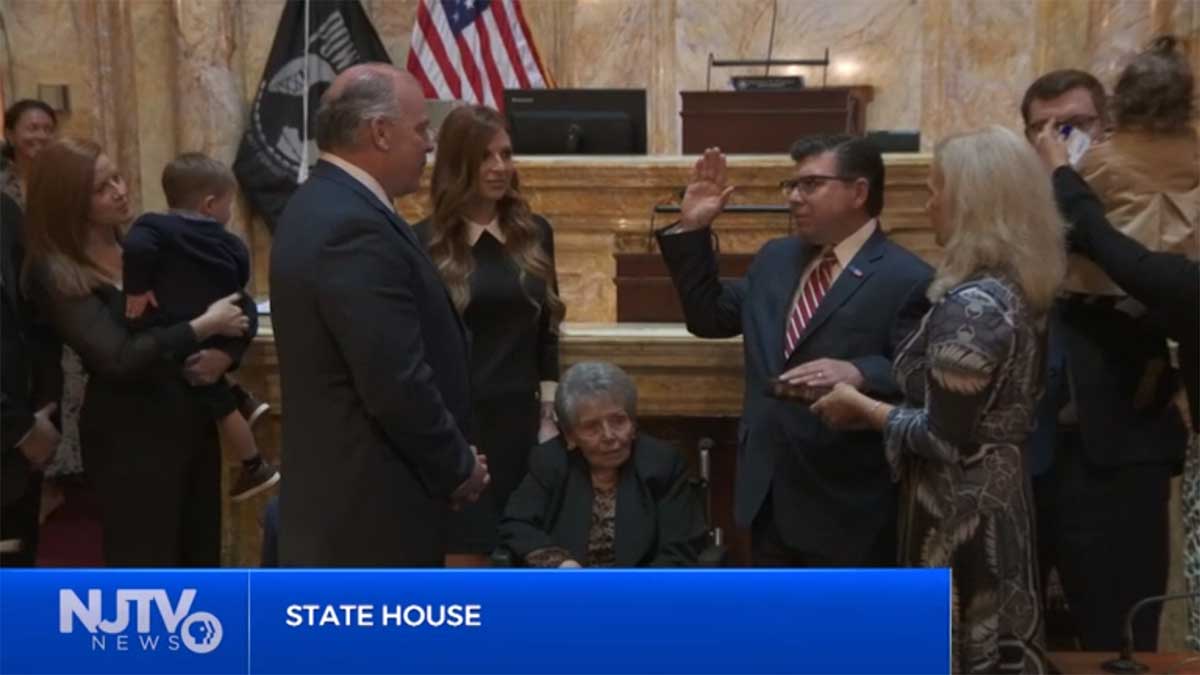In a somber ceremony at the State House, New Jersey lawmaker Anthony Bucco took over the state Senate seat his namesake father had held for more than 20 years until his death last month from a heart attack.
“We were best friends,” Bucco said of his father, after being sworn by Senate President Steve Sweeney. “We worked together every day, so I’m sure he’s smiling down today to see me and my family, you know, here. But it’s a tough day. I mean, it’s really tough. I haven’t had control over this process from the day he passed, and I’m just doing the best I can.”
Anthony M. Bucco has been currently a Republican member of the state Assembly and is already on next month’s ballot seeking re-election as one of two representatives to the lower house from District 25. His father, Anthony R. Bucco, died the same day as the ballot-preparation deadline, making it too late to update the Assembly ballot.
If Bucco wins the election, he’ll have to resign the seat in the lower house, setting off a special GOP convention in January where county party members would elect someone to fill the vacancy. A special election would be held in November 2020 for both the Senate and Assembly seat in his Morris/Somerset district, one heavily targeted by Democrats.
Bucco said there has been no discussion about who would fill the Assembly seat behind him: “We’re looking to get through Election Day and then we’ll sort that all out,” he said.
Sweeney, a Democrat, reminisced about the elder Bucco.
“Sen. Bucco was one hell of a man, a giant — really a giant,” he said. “When he shook your hand looked you in the eye and gave you his word, you took it to the bank.”
With the legislature heading into a lame-duck session, lawmakers are reviewing a proposal submitted by a bi-partisan tandem of former senators, Democrat Ray Lesniak and Republican Joe Kyrillos, for a replacement for the state’s lapsed economic-development programs designed to lure companies to set up shop in New Jersey.
Their proposal lacks a hard cap on the total value of tax breaks that can be awarded, a key demand of Gov. Phil Murphy and a sticking point in the stalled effort to renew the programs.
“I think the answer is flexible caps, and what I mean by that is, yes, you put a cap in for a given year, but if you have a particularly beneficial project for the state of New Jersey that’s going to bring in thousands of jobs, I think you should be able to modify the assistance based on the executive and legislative branch coming to an agreement,” said Sen. Bob Smith.
“I don’t think there’s a need for a cap,” said Sweeney, the governor’s chief adversary in the standoff. “The flexible cap is making the decisions whether you want to do it or not.”
Sweeney said Murphy himself had sought a higher cap for one specific incentive.
“The governor passed a film tax credit with a cap, and now he wants to raise the cap,” the Gloucester County Democrat said. “Well, if you didn’t have a cap you wouldn’t have to worry about coming back and limiting your projections.”
The Lesniak/Kyrillos proposal includes many of the concepts favored by the Murphy administration, including more safeguards to prevent abuse and decreasing the size of the awards.
Tim Sullivan — appointed by Murphy to lead the state Economic Development Authority, which oversees the program — took to Twitter this week to press the need for caps.
“Tax credits are tax expenditures. All expenditures should have budgets. Another word for budget is caps,” he posted on Wednesday.
Republican state Sen. Steven Oroho said New Jersey needs incentives to compete.
“We can focus on small to mid-size businesses, as well as innovation economy. I’m not opposed to that,” he said. “But the issue is, we need an economic incentive plan.”
A representative of the business community also weighed in on the competing reform proposals.
“We’ve had conversations with both sides,” said Tom Bracken, president and CEO of the NJ Chamber of Commerce. “What we hope to do is put them together side-by-side in a grid form and say, ‘Where are their commonalities’ that we can kind of put aside and say we agree on this, ‘where are their differences,’ and try to find a way for them to negotiate the differences so we can get to a final version quickly.”
Lawmakers said it was a question mark whether a settlement would be reached by the end of the year.
